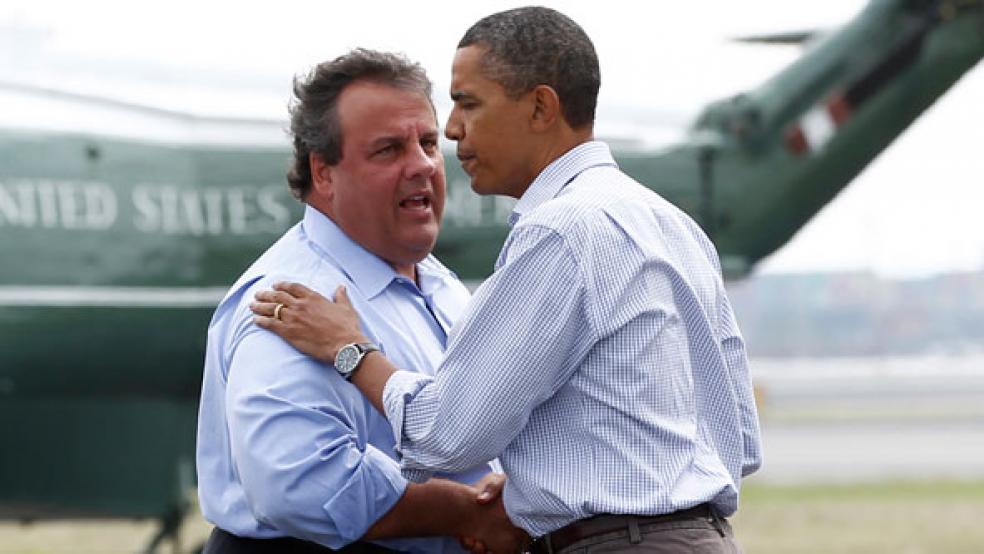What lessons can Scott Walker (and Mitt Romney and President Obama) learn from Chris Christie? Mainly this: Collaboration is valuable, and it really is important to “reach across the aisle.” There was a reason Obama campaigned on a promise to seek bipartisan accord; it polls well. Unhappily, from his first day in office, the thrill of victory overwhelmed our bumptious president. “We won” replaced “we can.”
In a campaign season where long-time Senator Richard Lugar is being punished for working with Democrats, how can we argue that bipartisanship succeeds? Consider the disparate fates of Governors Chris Christie and Scott Walker. Despite pushing through similar agendas, the former is a rising star while the latter finds his head on the chopping block. While Scott’s misadventures may also reflect bad timing, it is clear that voters resent his “my way or the highway” approach. Facing an election on June 5, the governor risks being only the third in our history to be recalled.
RELATED: Stimulus Fraud and Weak Jobs Pose Threat to Obama
Elected governor of New Jersey three years ago, Christie faced a Democratic legislature and had to negotiate with his opponents. In his first State of the State address, Christie went to great lengths to praise his political opponents for their cooperation. Touting a nine percent drop in state spending, a much-improved balanced budget, lower taxes (for the first time in a decade), an improving jobs picture, reductions in crippling public employee benefits programs and the beginnings of education reform, Christie thanked the legislature: We haven’t always agreed, and we haven’t always gotten what we wanted, but we have achieved compromise, and the people of New Jersey are better off as a result.” New Jerseyians appear to agree.
When Walker became governor in 2010 as part of the resurgent GOP, he took office with a Republican majority in both houses of Wisconsin’s legislature. As a result, he blasted through both a tight budget and a provocative change in union rules that brought the state to a standstill.
In a New Yorker piece describing the public outcry over Scott’s reform measures, William Finnegan says pointedly, “Scott Walker did not meet with opponents… .Walker never negotiated, and his budget-repair bill was passed with all its essentials intact.” High-handedness appears to be Walker’s major misstep. He failed to convince his political opponents or explain to Wisconsin voters why his measures made sense.
“Christie is building a record as a pragmatic centrist, a guy who gets things done by finding common ground with Democrats,” wrote Tom Moran in New Jersey’s Star Ledger. In this hotly partisan age, how does Christie get away with it?
It appears that voters desire more than ideological fealty; they demand action and solutions. If Christie can team with Democrats to rein in New Jersey property taxes – which had risen 70 percent in the ten years before he took office – bully for him. If he can collaboratively close a prospective $11 billion budget hole, so much the better.
In fairness, Walker’s misadventures can also be laid to bad timing. Christie took office in November 2009, a year before Walker and before the financial crisis so drastically walloped state and local employees. Though the recession began in 2007, and supposedly ended in mid-2009, the scope of government budget destruction took some time to emerge. Moreover, stimulus spending helped postpone the day of reckoning.
In 2009, a quarter of a million state and local government workers lost their jobs. The downtrend continued in 2010, alarming union leaders who had seen their fortunes wane in the private sector and had come to look upon ever-expanding public budgets as their most dependable future. The Bureau of Labor Statistics reports that “public-sector workers had a union membership rate (37.0 percent) more than five times higher than that of private-sector workers (6.9 percent).” Local government workers had an even higher rate of union membership, at 43 percent.
Labor leaders may have dismissed Indiana Governor Mitch Daniels’ move to curtail collective bargaining rights on his first day of office in 2005 as a one-off; but inroads by Republicans in the 2010 elections raised red flags. Ohio’s John Kasich, South Carolina’s Nikki Haley, Florida’s Rick Scott – in response to red ink, newly elected GOP governors targeted public service unions across the land.
Union leaders needed to take a stand, and they chose Wisconsin. It was a sound choice. Wisconsin historically had been a union-friendly state, having been the first to draft legislation such as worker’s compensation and unemployment insurance. In 2011, 13.3 percent of Wisconsin’s work force belonged to unions, ranking 18th in the country. Committing enormous resources to the struggle, union brass protested the assault on public workers’ rights and forced the recall election. Whether they will succeed remains to be seen.
Whatever the outcome, the message is clear. Political leaders, no matter how solid their majority or convincing their election results, succeed best when they win over both their opponents and the electorate to their agenda. It’s not easy. President Obama’s first three years is proof enough. He has failed to work with Republicans on major issues such as budget reform or immigration, and has consequently made little progress. He has blamed the GOP for intransigence, but his job is to lead, and that he has not done. As a consequence, Mr. Obama faces his own possible recall this coming November.






